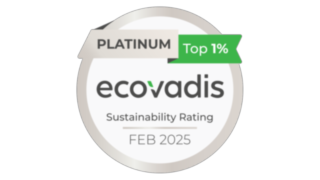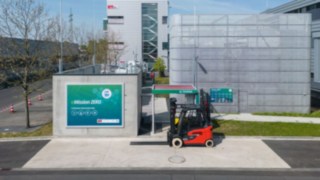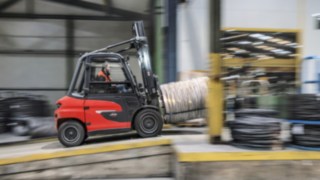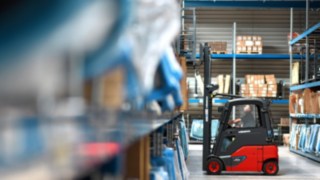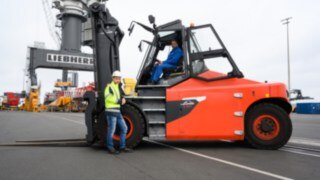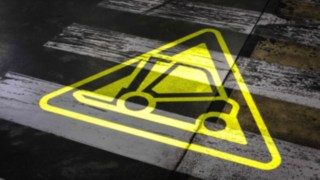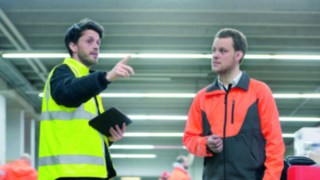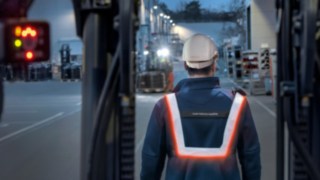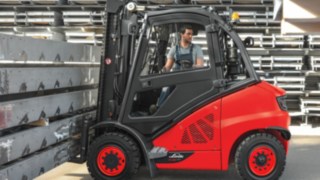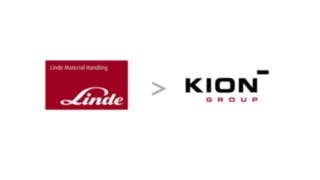Sustainability at Linde Material Handling
How We Put Responsibility into Practice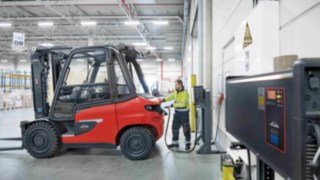
At Linde Material Handling, sustainability means taking responsibility: for the environment, for future generations, for our customers, and for our employees. We integrate environmental and social targets in every aspect of our business activities by setting ourselves a clear sustainability strategy.
As part of the KION Group, we have committed to going climate-neutral along our entire value chain by 2050. We are also guided by the criteria of the international Science Based Targets initiative (SBTi). Our trucks, software solutions, services, and consulting also help our customers achieve their targets for the environment and climate and ensure the health and safety of their employees. In this way, we ensure sustainable commercial success for our customers and ourselves for many years to come.
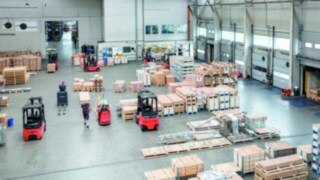

To bring the concept of sustainability to life, we integrate environmental and social objectives into our business processes and activities—in all that we do!
Ulrike Just, Executive Vice President Sales & Service at Linde Material Handling
Environmental Protection at Linde Material Handling
At Linde MH, we are continually working to optimize our systems and processes so we can use resources responsibly and minimize our environmental impact. We do this by focusing on energy, emissions, water, and waste.
| Environment | 2023 | 2022 | 2021 |
| ISO 14001 certification rate | 94% | 85% | 81% |
| Energy consumption | 1,107,453 GJ | 1,079,340 GJ | 1,143,040 GJ |
| Greenhouse gas emissions (Scope 1 and 2)* | 65,086 t CO₂e | 63,286 t CO₂e | 67,003 t CO₂e |
| Greenhouse gas emissions (Scope 3.3)* | 16,392 t CO₂e | 15,626 t CO₂e | 16,173 t CO₂ |
| Water withdrawal | 146,211 m³ | 140,942 m³ | 153,409 m³ |
| Waste produced | 38,529 t | 63,664 t | 34,136 t |
*Greenhouse gas emissions in kilograms of CO₂ equivalents, Scope 1 and 2 market-based, Scope 3.3 location-based.

Conserving Resources, Boosting Efficiency
Our platform concept with mixed assemblyis a flagship project when it comes to conserving resources efficiently. Based on this concept, different truck types can be built on the same platform using the same components.
It’s all possible thanks to innovations such as the screw with washer assembly, which can be installed in almost all types of forklift truck. This allows us to systematically reduce the number of components required and save on raw materials, storage space, and transportation costs. Established concepts, such as recycling Li-ion batteries, ensure that our resources stay in the circular economy.

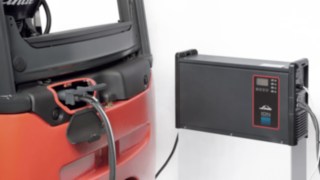
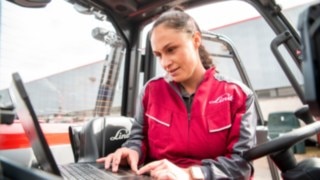
Digital applications also play a key role in making our processes more efficient and using our trucks sustainably. Thanks to digital twins, service technicians can diagnose faults or carry out updates remotely and take a proactive approach to component maintenance. Digital twins also make it possible to monitor the condition of batteries and fuel cells during operation and extend their lifespan by optimizing charging times.
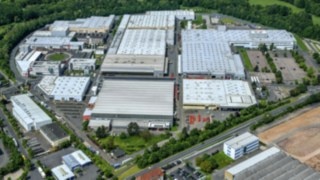
Taking Action at Every Site
We are gradually converting our own fleet to electric drives and expanding our charging infrastructure across the company. Plus, we are putting suitable environmental measures in place at every site. Since 2020, for example, we have been promoting the use of renewable energies at all our German sites. In Barcelona, we have installed a washing plant with a water treatment system that delivers maximum resource efficiency and minimum environmental impact. All of our locations have been certified in accordance with ISO 14001 (environmental management) since 2024. Our energy-intensive production sites have certified energy management systems. More on our activities to protect the environment.
Environmental Protection for our Customers
From product development and alternative power units to intelligent energy management—our comprehensive expertise in the areas of energy efficiency and emissions reduction is behind every product at Linde MH. We support our customers in selecting the trucks and energy systems that meet their needs by providing tailored advice and a wide range of products and solutions. Thanks to this approach, we help them to get the best out of their intralogistics and combine climate protection with cost-effectiveness.
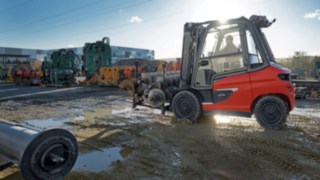
Product Development
Our trucks impress with maximum driving performance paired with minimum consumption and are designed for durability and ease of maintenance. Easy-access components and a modular design enable quick and straightforward maintenance and repair, increasing the lifespan of the trucks while minimizing downtime. Our platform concept puts materials to best use and reduces the need for spare parts—the latest generation of counterbalanced forklift trucks is a great example of this.
Alternative Fuels and Drive Technologies
We offer our customers a wide range of models with the right energy system to match their needs. Along with efficient combustion engines and lead-acid batteries, we are increasingly centering our truck development activities around lithium-ion batteries and fuel cells: Upcoming electric forklift models will be designed for both types of drive. Our lithium-ion battery systems are especially energy-efficient and reduce energy consumption.
At the end of 2022, 87.5% of the products sold by Linde MH were already equipped with an electric drive.
Energy Management
Rising energy costs and climate action call for a holistic approach to energy management. Intelligent energy management systems such as the Linde Energy Manager or the connect:charger can take energy efficiency and charging management to a new level. These systems enable transparency across all energy processes, holistic coordination, and optimization, and help to avoid electricity load peaks. Based on this, we help our customers to optimize their fleet, reduce carbon emissions, and save costs.
Circular Economy
We support our customers in their efforts to use resources efficiently and sustainably. Our lithium-ion batteries can be recycled and reused several times. Once used in a truck, they can have a second life as static storage batteries before the batteries are recycled free of charge at the end of their life cycle. This allows our customers to make optimum use of their resources.
Life Cycle Assessments
We are happy to assist customers who want to analyze and optimize their environmental footprint in greater detail. To this end, we provide detailed and reliable life cycle assessment data for our main product types, from pallet trucks to IC trucks, covering their entire life cycle. The data is based on a specially designed life cycle assessment method that we developed together with the Fraunhofer Institute for Building Physics (IBP). This method and the assessment have been tested and certified by TÜV Rheinland.
Our Electric Forklifts in Action
Health and Safety at Linde MH
At Linde Material Handling, the health and safety of our employees is our top priority. We live this out by following the KION HSE (health, safety, and environment) standard in everything we do. The standard applies throughout the Group and even goes beyond the legal requirements for health and safety.
Prevention is our guiding principle, so we offer our employees a comprehensive range of measures, including regular check-ups, a social counseling service, and targeted training on occupational health and safety. This is how we ensure the well-being and safety of our employees.
Health and Safety for our Customers
We actively support our customers in creating a safe working environment for their employees. We are pursuing our Vision Zero with the aim of completely eliminating accidents in intralogistics. To achieve this ambitious goal, we offer a wide range of safety solutions for people, industrial trucks, and goods—ranging from high-visibility vests and lighting solutions to AI-based camera systems. We also provide our customers with advice and offer tailored training programs for their companies.
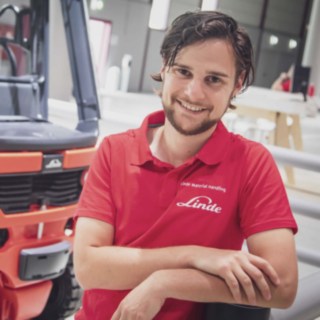
If you ask anyone in the logistics sector which brand of forklift truck is known for safety, Linde Material Handling is usually the very first answer.
Fabian Zimmermann, Product Manager for Safety at Linde Material Handling
Ergonomics as a Guiding Principle
Everything revolves around ergonomics when developing our products and services. By pursuing this guiding principle, we make day-to-day work as easy as possible for operators—so we can guarantee a safe and healthy working environment over the long-term.
Employer With Responsibility
Everyone deserves the same opportunities to develop their potential. Diversity, equality, and inclusion are therefore key components of our sustainability strategy. As a responsible employer, we are guided by strict ethical principles such as the KION Group Code of Compliance and the International Minimum Employment Standards. Among other things, these guarantee compliance with human rights, fair collective bargaining agreements, and the prohibition of forced and child labor as well as discrimination. Regular internal reviews and independent audits ensure that these principles are implemented.
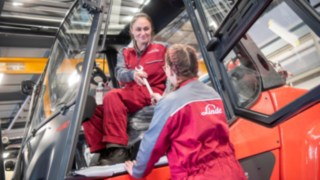
Fair Working Conditions
For us, fair opportunities also mean fair pay: the majority of our employees are covered by collective wage agreements and the principle of equal pay for equal work is regularly reviewed. As an attractive employer, we offer a wide range of career opportunities with continuous staff development and international career prospects. We are constantly evolving, for example in the area of work-life balance. There is also a particular focus on increasing the percentage of women in the company.
Social Engagement
Here at Linde MH, sustainability also means taking social responsibility, especially where customers, employees, and their families live and work.
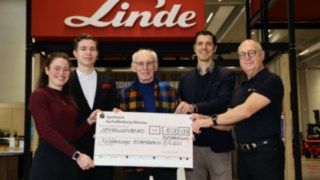
We are involved in numerous initiatives including Linde Solidaria, Les Restaurants du Cœur, and StaplerCup hilft e.V. Linde Material Handling’s social engagement is shaped to a large extent by the active involvement of our employees—whether through in-kind and cash donations or active support on the ground.
